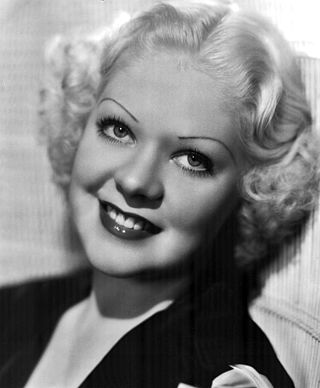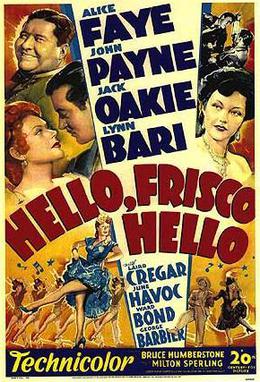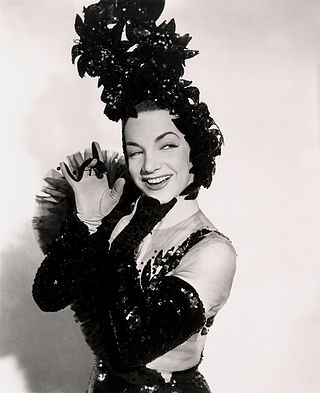
Maria do Carmo Miranda da Cunha, known professionally as Carmen Miranda, was a Portuguese-born Brazilian singer, dancer, and actress. Nicknamed "The Brazilian Bombshell", she was known for her signature fruit hat outfit that she wore in her American films.

Alice Faye was an American actress and singer. A musical star of 20th Century-Fox in the 1930s and 1940s, Faye starred in such films as On the Avenue (1937) and Alexander's Ragtime Band (1938). She is often associated with the Academy Award–winning standard "You'll Never Know", which she introduced in the 1943 musical film Hello, Frisco, Hello.
"You'll Never Know", sometimes referred to as "You'll Never Know (Just How Much I Love You)" in later years, is a popular song with music written by Harry Warren and the lyrics by Mack Gordon. The song is based on a poem written by a young Oklahoma war bride named Dorothy Fern Norris.

Hello, Frisco, Hello is a 1943 American musical film directed by H. Bruce Humberstone and starring Alice Faye, John Payne, Lynn Bari, and Jack Oakie. The film was made in Technicolor and released by 20th Century-Fox. This was one of the last musicals made by Faye for Fox, and in later interviews Faye said it was clear Fox was promoting Betty Grable as her successor. Released during World War II, the film became one of Faye's highest-grossing pictures for Fox.

The Gang's All Here is a 1943 American Twentieth Century Fox Technicolor musical film starring Alice Faye, Carmen Miranda and James Ellison. The film, directed and choreographed by Busby Berkeley, is known for its use of musical numbers with fruit hats. Included among the 10 highest-grossing films of that year, it was at that time Fox's most expensive production.

Rebecca of Sunnybrook Farm is a 1938 American musical comedy film directed by Allan Dwan, and written by Don Ettlinger, Karl Tunberg, Ben Markson and William M. Conselman, the third adaptation of Kate Douglas Wiggin's 1903 novel of the same name.

Down Argentine Way is a 1940 American musical film made in Technicolor by Twentieth Century Fox. It made a star of Betty Grable in her first leading role for the studio although she had already appeared in 31 films, and it introduced American audiences to Carmen Miranda. It also starred Don Ameche, The Nicholas Brothers, Charlotte Greenwood, and J. Carrol Naish.

Springtime in the Rockies is an American Technicolor musical comedy film released by Twentieth Century Fox in 1942. It stars Betty Grable, with support from John Payne, Carmen Miranda, Cesar Romero, Charlotte Greenwood, and Edward Everett Horton. Also appearing were Grable's future husband Harry James and his band. The director was Irving Cummings. The screenplay was based on the short story "Second Honeymoon" by Philip Wylie.

A Date with Judy is a 1948 American musical romantic comedy Technicolor film directed by Richard Thorpe and starring Wallace Beery, Jane Powell and Elizabeth Taylor. The film is based on the radio series of the same name.
"I Can't Begin to Tell You" is a popular song with music written by James V. Monaco and lyrics by Mack Gordon. The song was published in 1945.

That Night in Rio is a 1941 American Technicolor musical comedy film directed by Irving Cummings and starring Alice Faye, Don Ameche and Carmen Miranda. It was produced and distributed by Hollywood Twentieth Century Fox. It is one of several film adaptations of the 1934 play The Red Cat by Rudolf Lothar and Hans Adler. Others are Folies Bergère de Paris (1935) and On the Riviera (1951).

Hollywood Canteen is a 1944 American musical romantic comedy film starring Joan Leslie, Robert Hutton, Dane Clark and features many stars in cameo roles. and produced by Warner Bros. The film was written and directed by Delmer Daves and received three Oscar nominations.

You Can't Have Everything is a 1937 Fox musical film directed by Norman Taurog and produced by Darryl F. Zanuck. The film stars Alice Faye and Don Ameche, and was the film debut for Gypsy Rose Lee credited as Louise Hovick part of her birth name.

Wake Up and Live is a 1937 Fox musical film directed by Sidney Lanfield and produced by Darryl F. Zanuck, starring Jack Haley and Alice Faye plus Walter Winchell and Ben Bernie as themselves.
"I, Yi, Yi, Yi, Yi " is a 1941 song. It was written for the 1941 film That Night in Rio, and was popularized by Carmen Miranda. The lyrics were written by Mack Gordon and the music by Harry Warren.

Pin Up Girl is a 1944 American Technicolor musical romantic comedy motion picture starring Betty Grable, John Harvey, Martha Raye, and Joe E. Brown.

Carmen Miranda: Bananas is My Business is a 1995 documentary filmed and directed by Helena Solberg. This documentary chronicles the life and career of Carmen Miranda, Hollywood's symbol of Latin American spirit in the 1940s. The documentary tells her life story in a series of stages, beginning with her roots and rise to stardom in her home country of Brazil, her transition and development as a performer in the United States, first on Broadway in New York City, then in the film industry after she signed with 20th Century Fox in Los Angeles, and her later years in life, before her death and her return to Brazil. Helena Solberg uses two different film styles, biography and directorial reverie, in which Solberg uses actor Erick Barretos to “resurrect Carmen Miranda in several fantasy sequences. Helena Solberg's attitudes shift throughout the documentary from awe-struck child to empathetic and forgiving Brazilian woman, which she uses to represent the contradictory subplots of Carmen Miranda's life. Alongside the fantasy like resurrection of Miranda, Solberg accompanies her documentary with multiple interviews with Carmen Miranda's friends and family, like her sister, her first boyfriend, the guitarist Laurindo Almeida, samba song-writer Synval Silva, Cesar Romero, and Alice Faye.
"When I Love I Love" is a song written by Harry Warren and Mack Gordon and recorded by Carmen Miranda for the film Week-End in Havana in 1941.
Chica, Chica, Boom, Chic is a song composed by Harry Warren and Mack Gordon and recorded by Carmen Miranda for her 1941 film That Night in Rio.

This is a complete filmography of Carmen Miranda, a Portuguese-Brazilian singer, actress, and dancer.


















